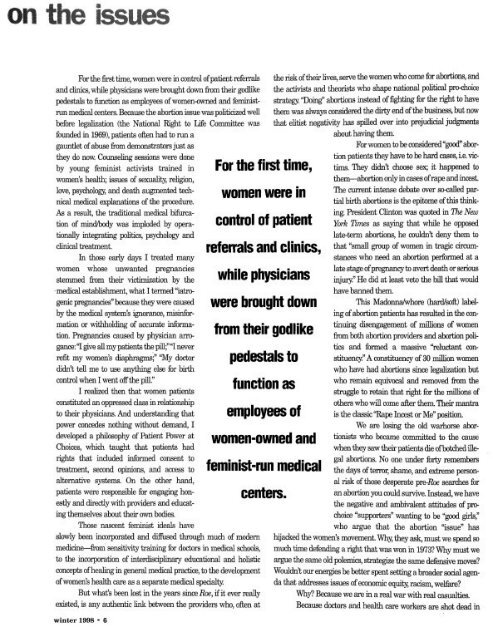women histories, incest sexual abuse. institutionalized. But what if ...
women histories, incest sexual abuse. institutionalized. But what if ...
women histories, incest sexual abuse. institutionalized. But what if ...
You also want an ePaper? Increase the reach of your titles
YUMPU automatically turns print PDFs into web optimized ePapers that Google loves.
on the issues<br />
For the first time, <strong>women</strong> were in control of patient referrals<br />
and clinics, while physicians were brought down from their godlike<br />
pedestals to function as employees of <strong>women</strong>-owned and feministr<br />
run medical centers. Because the abortion issue was politicized well<br />
before legalization (the National Right to L<strong>if</strong>e Committee was<br />
founded in 1969), patients often had to run a<br />
gauntlet of <strong>abuse</strong> from demonstrators just as<br />
they do now. Counseling sessions were done<br />
by young feminist activists trained in<br />
<strong>women</strong>'s health; issues of <strong>sexual</strong>ity, religion,<br />
love, psychology, and death augmented technical<br />
medical explanations of the procedure.<br />
As a result, the traditional medical b<strong>if</strong>urcation<br />
of mind/body was imploded by operationally<br />
integrating politics, psychology and<br />
clinical treatment.<br />
In those early days I treated many<br />
<strong>women</strong> whose unwanted pregnancies<br />
stemmed from their victimization by the<br />
• medical establishment, <strong>what</strong> I termed "iatrogenic<br />
pregnancies" because they were caused<br />
by the medical system's ignorance, misinformation<br />
or withholding of accurate information.<br />
Pregnancies caused by physician arrogance:<br />
"I give all my patients the pill;""I never<br />
refit my <strong>women</strong>'s diaphragms;" "My doctor<br />
didn't tell me to use anything else for birth<br />
control when I went off the pill."<br />
I realized then that <strong>women</strong> patients<br />
constituted an oppressed class in relationship<br />
to their physicians. And understanding that<br />
power concedes nothing without demand, I<br />
developed a philosophy of Patient Power at<br />
Choices, which taught that patients had<br />
rights that included informed consent to<br />
treatment, second opinions, and access to<br />
alternative systems. On the other hand,<br />
patients were responsible for engaging honestly<br />
and directly with providers and educai><br />
ing themselves about their own bodies.<br />
Those nascent feminist ideals have<br />
slowly been incorporated and d<strong>if</strong>iused through much of modern<br />
medicine—from sensitivity training for doctors in medical schools,<br />
to the incorporation of interdisciplinary educational and holistic<br />
concepts of healing in general medical practice, to the development<br />
of <strong>women</strong>'s health care as a separate medical specialty<br />
<strong>But</strong> <strong>what</strong>'s been lost in the years since Roe, <strong>if</strong> it ever really<br />
existed, is any authentic link between the providers who, often at<br />
winter 1998 - 6<br />
For the first time,<br />
<strong>women</strong> were in<br />
control of patient<br />
referrals and clinics,<br />
while physicians<br />
were brought down<br />
from their godlike<br />
pedestals to<br />
function as<br />
employees of<br />
<strong>women</strong>-owned and<br />
feminist-run medical<br />
centers.<br />
the risk of their lives, serve the <strong>women</strong> who come for abortions, and<br />
the activists and theorists who shape national political pro-choice<br />
strategy. "Doing" abortions instead of fighting for the right to have<br />
them was always considered the dirty end of the business, but now<br />
that elitist negativity has spilled over into prejudicial judgments<br />
about having them.<br />
For <strong>women</strong> to be considered "good" abortion<br />
patients they have to be hard cases, i.e. victims.<br />
They didn't choose sex; it happened to<br />
them—abortion only in cases of rape and <strong>incest</strong>.<br />
The current intense debate over so-called partial<br />
birth abortions is the epitome of this thinking.<br />
President Clinton was quoted in The New<br />
York Times as saying that while he opposed<br />
late-term abortions, he couldn't deny them to<br />
that "small group of <strong>women</strong> in tragic circumstances<br />
who need an abortion performed at a<br />
late stage of pregnancy to avert death or serious<br />
injury." He did at least veto the bill that would<br />
have banned them.<br />
This Madonna/whore (hard/soft) labeling<br />
of abortion patients has resulted in the continuing<br />
disengagement of millions of <strong>women</strong><br />
from both abortion providers and abortion politics<br />
and formed a massive "reluctant constituency"<br />
A constituency of 30 million <strong>women</strong><br />
who have had abortions since legalization but<br />
who remain equivocal and removed from the<br />
struggle to retain that right for the millions of<br />
others who will come after them. Their mantra<br />
is the classic "Rape Incest or Me" position.<br />
We are losing the old warhorse abortionists<br />
who became committed to the cause<br />
when they saw their patients die of botched illegal<br />
abortions. No one under forty remembers<br />
the days of terror, shame, and extreme personal<br />
risk of those desperate pre-Rbe searches for<br />
an abortion you could survive. Instead, we have<br />
the negative and ambivalent attitudes of prochoice<br />
"supporters" wanting to be "good girls,"<br />
who argue that the abortion "issue" has<br />
hijacked the <strong>women</strong>'s movement. Why, they ask, must we spend so<br />
much time defending a right that was won in 1973? Why must we<br />
argue the same old polemics, strategize the same defensive moves?<br />
Wouldn't our energies be better spent setting a broader social agenda<br />
that addresses issues of economic equity, racism, welfare?<br />
Why? Because we are in a real war with real casualties.<br />
Because doctors and health care workers are shot dead in

















